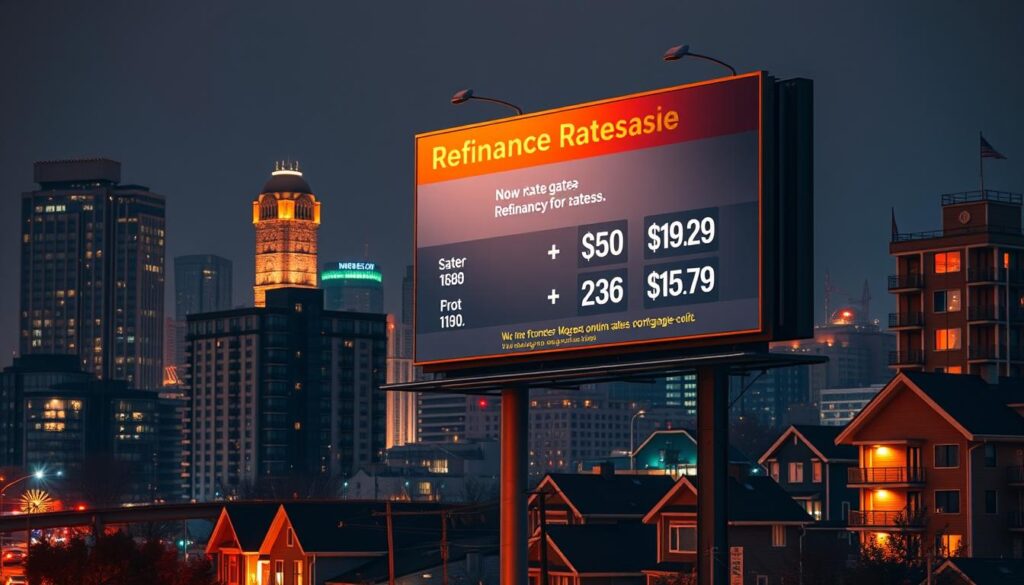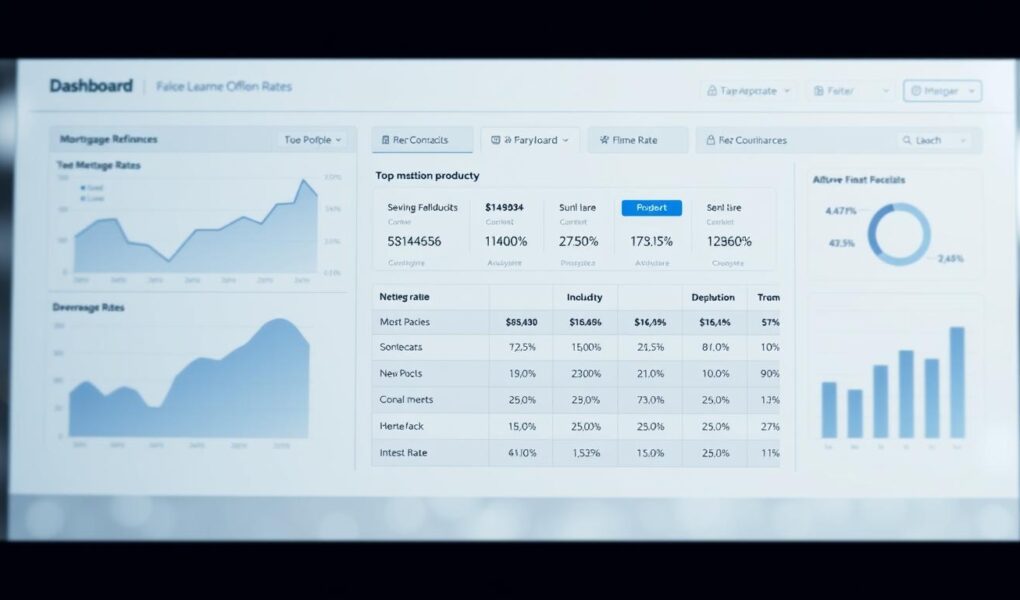“The best time to refinance your mortgage is when it makes financial sense for you,” posits Robert Kiyosaki, a celebrated author and financial guru. Refinancing can significantly benefit homeowners by securing a lower interest rate or transitioning to a more advantageous loan term, thus saving thousands of dollars.
Given the plethora of lenders offering disparate refinance rates, it is imperative to engage in a comparative analysis to identify the most advantageous offer. This endeavor enables homeowners to potentially diminish their monthly outlays, expedite loan repayment, or leverage their home’s equity.
Comparing premier lenders is crucial to optimize savings on mortgage refinance rates. This article will navigate you through the process of identifying the most competitive lenders and rates, empowering you to make an informed decision.
Key Takeaways
- Understand the importance of comparing mortgage refinance rates among top lenders.
- Learn how to save money by securing a lower interest rate or favorable loan term.
- Discover the benefits of refinancing, including lower monthly payments and paying off your loan sooner.
- Find out how to tap into your home’s equity through refinancing.
- Get insights into the factors that affect refinance rates.
Understanding Mortgage Refinancing Basics
Grasping the foundational principles of mortgage refinancing is imperative for crafting well-informed decisions regarding your home loan. This process entails the substitution of your current mortgage with a novel loan, often characterized by disparate terms.
What Is Mortgage Refinancing?
Mortgage refinancing constitutes the act of securing a new mortgage to supplant an existing one. This new loan extinguishes the original mortgage, prompting the commencement of payments on the new loan. The terms of the new loan, encompassing interest rates, payment schedules, and loan durations, may diverge significantly from those of the original mortgage.
Benefits of Refinancing Your Mortgage
Refinancing your mortgage can yield several advantages, including diminished monthly payments, reduced interest rates, and the capacity to leverage your home’s equity. Through refinancing, homeowners may potentially curtail expenses by thousands of dollars over the loan’s duration.
| Benefits | Description |
|---|---|
| Lower Monthly Payments | Refinancing to a lower interest rate or extending the loan term can diminish your monthly mortgage payments. |
| Reduced Interest Rate | Transitioning to a loan with a lower interest rate can yield savings over the loan’s lifespan. |
| Tapping into Home Equity | A cash-out refinance enables the utilization of some of the equity accumulated in your home. |
By comprehending these fundamentals, homeowners are empowered to make judicious decisions regarding whether refinancing aligns with their financial circumstances.
Current Mortgage Refinance Rates in 2025
As we enter 2025, the mortgage refinance rate landscape presents an opportunity for homeowners to capitalize on savings. The current rates are pivotal for those contemplating refinancing their residences.
Today’s Average Refinance Rates
The prevailing average refinance rate for a 30-year fixed mortgage hovers around 6.5%. This rate has exhibited minor variability over recent months, maintaining a relatively stable trajectory.
| Loan Term | Average Rate |
|---|---|
| 30-Year Fixed | 6.5% |
| 20-Year Fixed | 6.3% |
| 15-Year Fixed | 6.0% |
Historical Rate Trends
An examination of historical trends reveals considerable fluctuations in mortgage refinance rates. For example, in 2020, rates plummeted to historic lows, below 3%. However, subsequent economic shifts have led to an upward trajectory.
“The Federal Reserve’s decisions on interest rates have a direct impact on mortgage refinance rates, making it essential for homeowners to stay informed.” –
Rate Forecasts for the Coming Year
Projections for mortgage refinance rates in the forthcoming year indicate a gradual decline, potentially reaching approximately 6% by 2025’s end. These forecasts are predicated on anticipated economic developments and the Federal Reserve’s policy adjustments.
Homeowners are advised to monitor these forecasts closely and seize the opportunity to lock in rates when they are advantageous.
Factors That Influence Your Refinance Rate
Grasping the elements that shape your mortgage refinance rate is paramount for strategic decision-making. In the pursuit of refinancing, several pivotal factors emerge, dictating the interest rate you will be offered.
Credit Score Impact
Your credit score is a pivotal determinant in the refinance rate calculation. A superior credit score signifies to lenders a diminished risk, potentially affording you low mortgage refinance rates. Specifically, a score of 750 or above can substantially enhance your eligibility for advantageous rates.
Loan-to-Value Ratio
The loan-to-value (LTV) ratio is another critical element. It is derived by dividing the loan amount by the home’s value. A diminished LTV ratio can lead to superior refinance rates, as it represents a lower risk for the lender.

Loan Term Selection
The duration of your loan significantly impacts your refinance rate. Typically, shorter loan terms are associated with lower interest rates but higher monthly installments. The selection of an appropriate loan term hinges on your fiscal circumstances and objectives.
Property Type Considerations
The nature of your property also influences your refinance rate. For instance, investment properties generally command higher interest rates than primary residences.
| Factor | Impact on Refinance Rate |
|---|---|
| Credit Score | Higher score = lower rate |
| Loan-to-Value Ratio | Lower LTV = better rate |
| Loan Term | Shorter term = lower rate |
| Property Type | Primary residence = better rate |
By comprehending and managing these variables, you can potentially secure a more advantageous mortgage refinance rate near you. It is crucial to engage in a comparative analysis of rates from various lenders to identify the most favorable offer.
Top Mortgage Refinance Lenders Compared
The plethora of mortgage refinance lenders necessitates a meticulous comparison to ensure an informed decision. Opting for the right lender can significantly reduce financial burdens over the loan’s lifespan. This section delineates a comparative analysis of premier mortgage refinance lenders, encompassing their distinctive features, advantages, and disadvantages.
Rocket Mortgage
Overview
Rocket Mortgage distinguishes itself as a leading online lender, renowned for its streamlined application process and competitive interest rates. It caters to a variety of refinance needs, including rate-and-term and cash-out refinancing options.
Pros
- Fast Application Process: The online platform of Rocket Mortgage facilitates a swift application process.
- Competitive Rates: Offering competitive interest rates, Rocket Mortgage is an attractive option for homeowners seeking cost savings.
- Excellent Customer Service: Renowned for its responsive customer service, Rocket Mortgage ensures a satisfactory experience.
Cons
- Limited In-Person Support: As an online-centric lender, Rocket Mortgage’s physical branch network is limited.
- Origination Fees: Some borrowers might encounter higher origination fees compared to other lenders.
Features
- Online Application: The convenience of an online application process is a hallmark of Rocket Mortgage.
- Rate Lock: Offering a rate lock feature, Rocket Mortgage safeguards against rate fluctuations during the application period.
Recommendations
Rocket Mortgage is particularly suited for homeowners prioritizing a streamlined application process. It is an excellent choice for those who prefer online applications and seek competitive rates.
Bank of America
Overview
Bank of America, a stalwart in the financial sector, provides a spectrum of mortgage refinance options. These include rate-and-term and cash-out refinancing, alongside a variety of loan programs such as fixed-rate and adjustable-rate loans.
Pros
- Existing Customer Benefits: Bank of America extends discounts to its existing customers on refinance loans.
- Variety of Loan Programs: Catering to diverse needs, Bank of America offers a broad array of loan programs.
- In-Person Support: With an extensive network of branches, Bank of America ensures robust in-person support.
Cons
- Stricter Credit Requirements: Bank of America imposes more stringent credit criteria than some competitors.
- Higher Fees: Certain borrowers might encounter elevated fees compared to other lenders.
Features
- Mortgage Refinance Calculator: Bank of America provides a mortgage refinance calculator to facilitate payment estimation.
- Personalized Service: Bank of America’s mortgage specialists offer tailored guidance throughout the refinance journey.
Recommendations
Bank of America is an optimal choice for existing customers aiming to leverage discounts. It is also suitable for those who prefer in-person support and a diverse range of loan programs.
Wells Fargo
Overview
Wells Fargo, a prominent banking institution, offers a myriad of mortgage refinance options. It provides a range of loan programs, including fixed-rate and adjustable-rate loans, as well as government-backed loans.
Pros
- Variety of Loan Options: Wells Fargo’s extensive range of loan programs caters to various needs.
- Competitive Interest Rates: Offering competitive interest rates, Wells Fargo is a cost-effective option for homeowners.
- Excellent Customer Service: Wells Fargo is celebrated for its responsive customer service, ensuring a superior experience.
Cons
- Stricter Credit Requirements: Wells Fargo may have more stringent credit criteria than some competitors.
- Fees: Some borrowers might encounter higher fees compared to other lenders.
Features
- Online Application: Wells Fargo’s online application process offers convenience.
- Mortgage Refinance Experts: Wells Fargo’s mortgage specialists provide comprehensive guidance throughout the refinance process.
Recommendations
Wells Fargo is ideal for homeowners seeking a variety of loan options and competitive interest rates. It is a preferred choice for those valuing excellent customer service and willing to meet the credit requirements.
Best Online Mortgage Refinance Options
Advancements in technology have transformed the mortgage refinance landscape, introducing online platforms that streamline the process. With numerous lenders offering competitive mortgage refinance rates today, it is imperative to identify the most advantageous online options.
Better.com
Overview
Better.com stands out as a pioneering online mortgage lender, distinguished by its efficient refinance process and attractive rates. It caters to a broad spectrum of refinancing needs, including cash-out and rate-and-term refinancing.
Pros
- Fast and Efficient: Renowned for its expedited application and closing processes, Better.com exemplifies the epitome of speed and efficiency.
- Competitive Rates: Offering rates that are among the most competitive in the market, they empower homeowners to significantly reduce their mortgage payments.
- User-Friendly Platform: The intuitive design of their online platform ensures a seamless user experience, making navigation effortless.
Cons
- Limited In-Person Interaction: As an online entity, Better.com may not align with the preferences of those who value direct, face-to-face interactions.
- Credit Score Requirements: Although accommodating a range of credit scores, the most favorable rates are typically reserved for individuals with superior credit profiles.
Features
- Multiple Refinance Options: Catering to diverse needs, Better.com provides a variety of refinance products, including FHA and VA loans.
- Personalized Support: Throughout the refinance journey, they offer dedicated customer support, ensuring a tailored experience.
Recommendations
For homeowners desiring a seamless online refinance experience with competitive mortgage refinance rates today, Better.com is a recommended choice. It is particularly beneficial for those with commendable credit scores.
LoanDepot
Overview
LoanDepot is a prominent online mortgage lender, renowned for its extensive range of refinance options. They are celebrated for their adaptable loan terms and competitive interest rates.
Pros
- Variety of Loan Options: LoanDepot’s diverse product range, including jumbo loans and non-QM loans, caters to a wide array of financial needs.
- Competitive Pricing: By offering rates that are among the most competitive in the market, they facilitate substantial savings for homeowners.
Cons
- Complex Application Process: Some users have reported a more intricate application process compared to other online lenders.
- Fees: While they provide competitive rates, certain fees may be higher compared to other lenders, potentially impacting overall costs.
Features
- Customizable Loan Options: LoanDepot empowers borrowers to tailor their loan terms to suit their unique financial circumstances.
- Experienced Customer Service: Their reputation for providing knowledgeable customer support is well-established.
Recommendations
LoanDepot is advisable for homeowners seeking a plethora of refinance options and flexible loan terms. It is particularly suitable for those who may not conform to traditional lending criteria.
In the quest for online mortgage refinance solutions, a comparative analysis of lenders such as Better.com and LoanDepot is crucial. By evaluating factors such as rates, fees, and customer service, homeowners can make an informed decision that aligns with their financial objectives.
Best Mortgage Refinance Rates for Different Credit Profiles
Grasping the nuances of your credit profile is paramount when aiming for the most advantageous mortgage refinance rates. The magnitude of your credit score directly correlates with the interest rates proffered by lenders. This section elucidates the various refinance rate spectrums contingent upon disparate credit profiles.
Options for Excellent Credit (740+)
Individuals boasting an exemplary credit score (740+) are poised to secure the lowest mortgage refinance rates. Such a credit standing is perceived as a low-risk proposition by lenders, thereby affording them the flexibility to present competitive rates. For instance, refinance rates as low as 6.25% APR are attainable.
Options for Good Credit (670-739)
Those with a commendable credit score (670-739) are still eligible for advantageous refinance rates, albeit marginally higher than those for superior credit scores. Anticipate rates hovering around 6.5% APR. Shopping around and scrutinizing offers from diverse lenders is imperative to uncover the most advantageous proposition.
Options for Fair Credit (580-669)
For individuals with a fair credit score (580-669), refinance avenues are available albeit at elevated interest rates, typically surpassing 7% APR. Prioritizing the enhancement of your credit score before application or exploring specialized lenders catering to fair credit profiles is advisable.
Options for Challenging Credit Situations
Those confronting formidable credit challenges (below 580) will encounter more arduous refinancing endeavors. In such scenarios, considering specialized loan programs or striving to elevate your credit score before pursuing refinancing options is prudent.

In the quest for optimal mortgage refinance rates, comprehending the influence of your credit profile on available options is crucial. By sustaining a commendable credit score and diligently comparing lender proposals, securing a more advantageous refinance rate becomes attainable.
Types of Mortgage Refinance Loans
Mortgage refinance loans encompass a variety of forms, each tailored to address distinct financial objectives and circumstances. Grasping these options is imperative for homeowners aiming to make strategic decisions regarding their mortgage.
Rate-and-Term Refinance
The rate-and-term refinance stands as a prevalent choice among mortgage refinancing options. It entails the substitution of an existing mortgage with a new one, often featuring a lower interest rate or a modified loan term. This approach can facilitate a reduction in monthly mortgage payments or facilitate a transition from an adjustable-rate to a fixed-rate loan.
For instance, homeowners with mortgages bearing high interest rates may benefit from refinancing to a lower rate, thereby curtailing monthly expenditure. A recent study indicates that such refinancing can lead to an average monthly savings of $300 on mortgage payments.
“Refinancing to a lower interest rate can be a smart financial move, but it’s essential to consider the costs involved.” –
Cash-Out Refinance
A cash-out refinance enables homeowners to refinance their mortgage for an amount exceeding their current liability, thereby securing the difference in cash. This option is particularly advantageous for those requiring funds for home enhancements, debt consolidation, or other financial exigencies.
For example, homeowners with a home valued at $200,000 and a mortgage liability of $150,000 could refinance for $180,000, thereby securing $30,000 in cash. However, it is crucial to weigh the potential risks, including increased debt and the possibility of losing the home if unable to meet payment obligations.
| Refinance Type | Purpose | Benefits |
|---|---|---|
| Rate-and-Term | Lower interest rate or change loan term | Reduced monthly payments, stable interest rate |
| Cash-Out | Access cash for financial needs | Funds for home improvements, debt consolidation |
| FHA Streamline | Simplify refinance process for FHA loans | Less documentation, lower costs |
| VA IRRRL | Lower interest rate for VA loans | Reduced monthly payments, minimal paperwork |
FHA Streamline Refinance
The FHA Streamline Refinance is specifically designed for homeowners holding existing FHA loans. This program streamlines the refinance process by minimizing documentation requirements and eliminating the necessity for an appraisal in certain scenarios.
VA Interest Rate Reduction Refinance Loan (IRRRL)
The VA IRRRL, commonly referred to as a VA streamline refinance, is accessible to veterans and active-duty military personnel with existing VA loans. This program enables borrowers to refinance their VA loan to a lower interest rate with minimal documentation and no appraisal requirement.
When exploring mortgage refinance options, it is crucial to compare rates and terms from various lenders to identify the best mortgage refinance rates for your specific situation. By comprehending the diverse types of refinance loans available, homeowners can make informed decisions that align with their financial objectives.
How to Compare Mortgage Refinance Rates Effectively
To make an informed decision, it’s essential to understand how to compare mortgage refinance rates effectively. Comparing rates is not just about finding the lowest number; it’s about understanding the overall cost of the loan.
Beyond the Interest Rate: Understanding APR
The Annual Percentage Rate (APR) is a crucial factor when comparing mortgage refinance rates. It includes not only the interest rate but also other costs such as origination fees and points. Understanding APR gives you a clearer picture of the loan’s total cost.
Evaluating Closing Costs and Fees
Closing costs and fees can significantly impact the overall cost of your refinance loan. It’s essential to factor these costs into your comparison. Lenders may charge different fees for services like appraisal, title insurance, and loan origination.
Using Rate Comparison Tools
Utilizing online rate comparison tools can simplify the process of evaluating different lenders. These tools allow you to compare rates side-by-side, helping you identify the best option for your financial situation.
Reading the Fine Print
Always read the fine print when comparing mortgage refinance rates. Look for any prepayment penalties, rate adjustment caps, and other terms that could affect your loan’s cost over time. Being informed will help you avoid unexpected surprises.
The Refinance Application Process
The journey through the refinance application process, though complex, can be navigated with a clear understanding of its phases. To leverage the most advantageous mortgage refinance rates today, homeowners must be well-prepared for the application’s intricacies.
Required Documentation
The initial step in the refinance application process is the compilation of essential documents. Lenders generally demand:
- Identification documents (driver’s license, passport)
- Financial statements (bank statements, pay stubs)
- Property-related documents (property deed, insurance information)
Ensuring the availability of these documents can expedite the process, thereby facilitating the attainment of current mortgage refinance rates.
Timeline Expectations
The duration of the refinance application process can fluctuate, typically spanning between 30 to 45 days. A detailed outline is provided below:
| Stage | Timeline |
|---|---|
| Application Submission | 1-3 days |
| Processing | 15-30 days |
| Closing | 1-2 weeks |
Common Approval Challenges
Several hurdles can impede the approval process, including:
- Credit score issues
- Insufficient income documentation
- Property appraisal discrepancies
Anticipating these potential obstacles can facilitate proactive preparation, thereby circumventing delays.
Closing Process Overview
The closing stage entails the meticulous review and signing of the final loan agreements. It is crucial to scrutinize the terms meticulously to confirm alignment with your expectations and to ensure the acquisition of the most favorable mortgage refinance rates today.
When Refinancing Makes Financial Sense
Refinancing your mortgage can present numerous advantages, yet it is imperative to assess its financial prudence. To make an informed choice, several critical factors must be evaluated, significantly influencing your fiscal well-being.
Break-Even Point Analysis
The break-even point is a pivotal consideration, representing the duration required for the savings from the new loan to compensate for the refinancing expenses. This is calculated by dividing the total closing costs by the monthly savings. For example, with $3,000 in closing costs and a monthly savings of $100, the break-even point is 30 months.
Rate Differential Considerations
The rate differential between your current mortgage rate and the proposed refinance rate is another critical aspect. A common guideline suggests refinancing if the rate reduction is at least 0.5% to 1%. Nonetheless, this guideline may not universally apply, as it depends on your unique circumstances and the loan type involved.
How Long You Plan to Stay in Your Home
The duration of your residency in the home is a decisive factor. If imminent relocation is anticipated, the refinancing costs may not be economically viable. Conversely, if you intend to remain in the home for an extended period, the long-term savings from a lower interest rate can be considerable.
Current Equity Position
Your current equity position is another crucial element. Significant equity in your home can qualify you for more favorable refinance rates. Lenders perceive loans with lower loan-to-value ratios as less risky, leading to more advantageous terms for you.
By meticulously weighing these factors and consulting with a mortgage expert, you can ascertain whether refinancing to capitalize on low mortgage refinance rates in 2025 aligns with your financial objectives.
Conclusion: Making the Right Refinance Decision
The process of making an informed refinance decision necessitates a thorough examination of several critical elements, including mortgage refinance rates, loan terms, and one’s financial objectives. A comprehensive understanding of mortgage refinancing fundamentals, coupled with a comparative analysis of rates from leading financial institutions, can significantly contribute to financial savings and the realization of personal financial goals.
Securing the best mortgage refinance rates demands a proactive approach to rate comparison across a variety of lenders, encompassing both traditional brick-and-mortar establishments and online platforms such as Better.com and LoanDepot. It is imperative to consider your credit score, loan-to-value ratio, and desired loan term to identify the most advantageous refinance option for your specific circumstances.
Adherence to the principles discussed in this article empowers you to approach the refinance process with confidence, ensuring that your decision is both informed and aligned with your financial aspirations. Whether your aim is to reduce monthly payments, leverage your home’s equity, or transition to a more stable loan product, refinancing emerges as a potent tool for enhancing financial stability.



